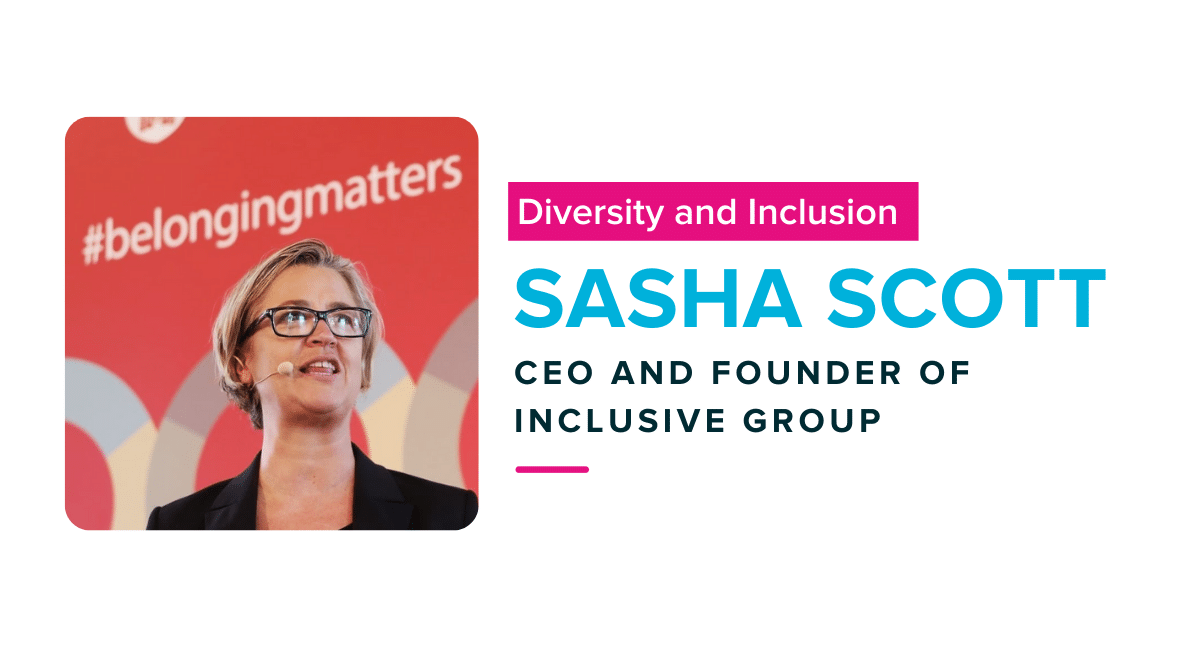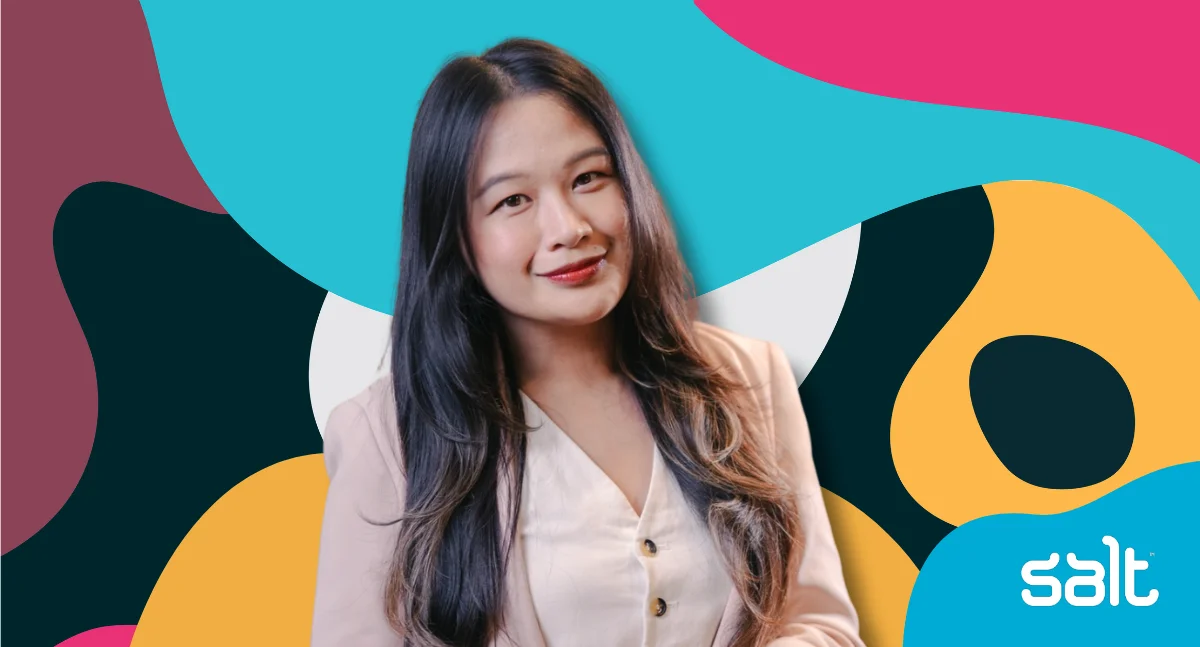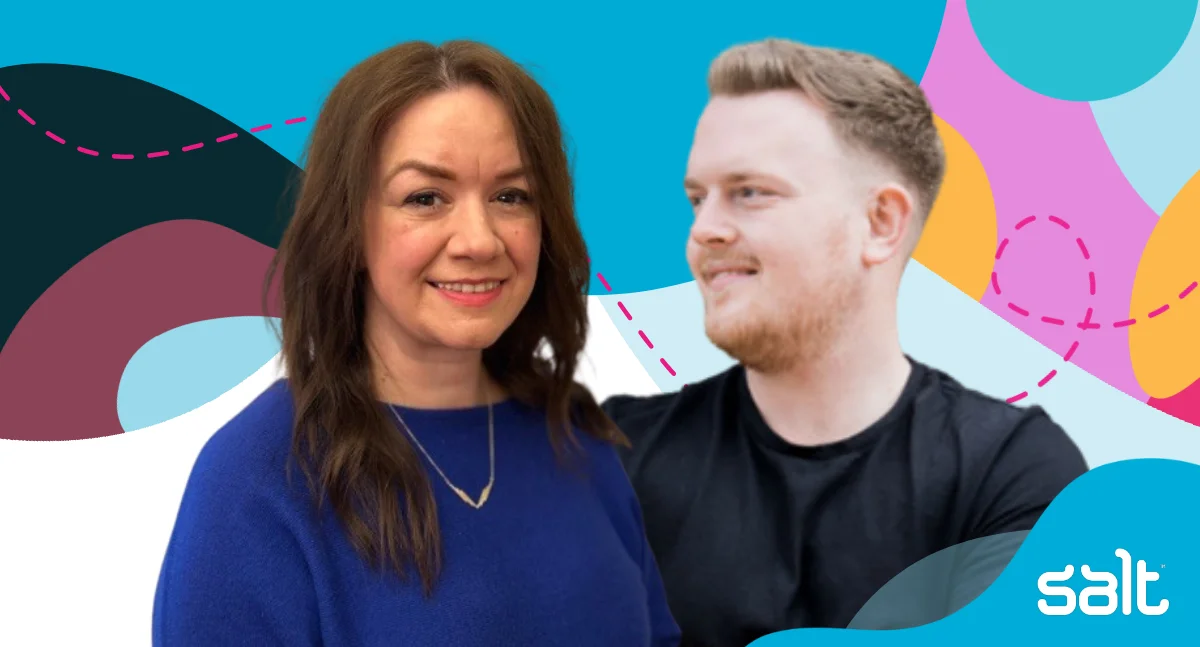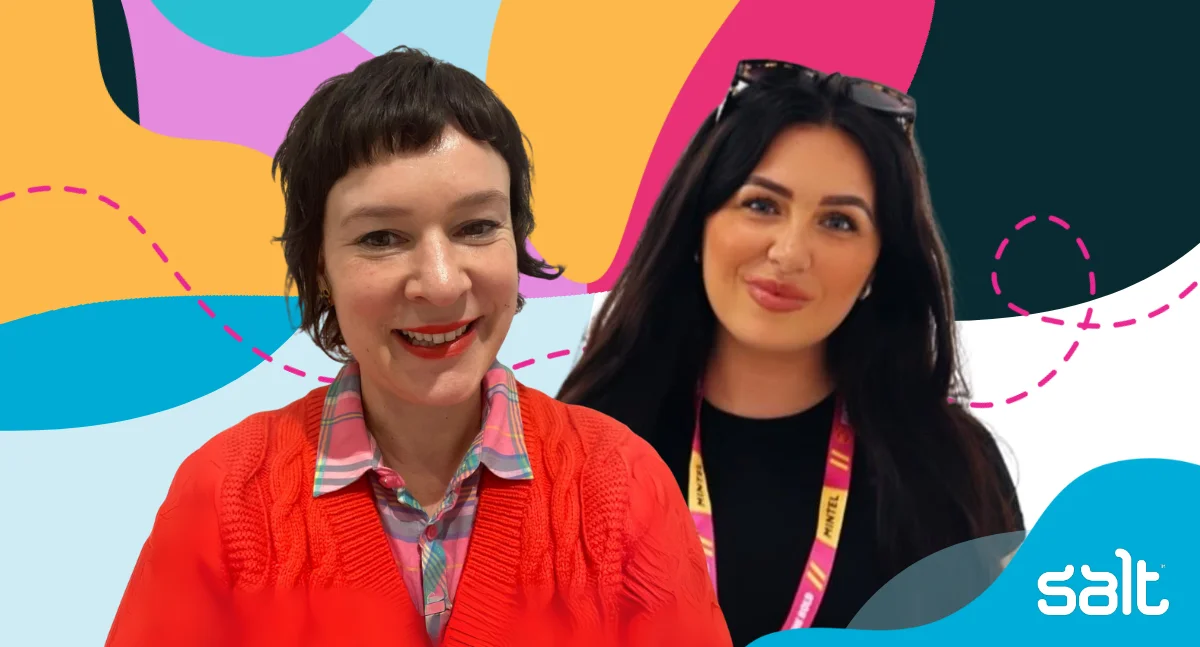
For our latest instalment of our Diversity and Inclusion interview series, we were pleased to speak with Sasha Scott, CEO and Founder of Inclusive Group, one of the top 10 diversity companies in the Global Diversity List 2020.
Sasha Scott is an expert in diversity, bias, inclusivity and managing psychological health. Sasha’s reputation has grown as an “international thought leader in diversity issues” and she has appeared on the BBC, and has been published in The Times, The Guardian, City AM, The Lawyer, Law Gazette, Accountancy Age, Complient, Personnel Today, and Recruiter magazine.
Here, Sasha shares her insights with Salt into diversity and inclusion and discusses psychological safety and its importance in the workplace, authenticity, predictions of trends and behaviours towards inclusion, and lots more.
Hi Sasha, thank you for joining our diversity and inclusion series. Can you tell us more about yourself and how The Inclusive Group came to be?
Having read psychology in university, I went to work in Investment Banking where I spent 13 years on trading room floors in London selling derivatives. It was a job I really loved, more for the excitement, adrenaline, and observation of human behaviour, than an understanding of the maths behind what I did.
20 years ago, I set up Inclusive Group, a full-service diversity organisation. I’ve come full circle from my degree and my innate interest in people and behaviour. I absolutely love what I do which makes it not work at all but a passion.
It’s been an interesting and volatile journey. I came out as a lesbian in my late 40’s, which really made me understand the need for authenticity. That’s helped me drive and embed the business much deeper than I ever did before because I’m actually my true self and the LGBTQ+ community is incredibly supportive.
I can quite honestly say this work has impassioned me more than anything, especially this year – a year of great volatility and change and I look forward to working very hard with my team as we move forward in 2021. Being placed as one of the top 10 diversity companies globally has given us real impetus to keep advocating and helping organisations address inclusion.
What trends do you expect to see around inclusion in the next three years?
My overwhelming anticipation is to expect more volatility because volatility in diversity and inclusion has represented 2020. On top of that, I anticipate metrics taking centre stage because if you can’t measure it, you cannot manage it. Metrics are becoming a lot more sophisticated and from a HR perspective, they help us understand our targets, pace, where we lose people and give us more of an understanding of why people leave organisations.
Metrics and pay transparency are linked. We expect to see more pay transparency around ethnicity and other elements of diversity. In the UK, we already have gender pay gap reporting for companies with over 250 employees and there has been a very strong call for ethnicity reporting.
This leads onto our next prediction, which is more of a focus on racial justice and addressing structural racism within organisations and society at large. Authenticity and accountability will be buzzwords in 2021 but it is important that organisations get these right and are accountable, especially addressing racial justice.
I predict there will be a much deeper focus on inclusive behaviour and a lessening of a focus on unconscious bias as a standalone solution. This is especially important as the UK government has recently scrapped unconscious bias training as an intervention. There will also be a dedicated diversity and inclusion seat on more boards and organisations will adopt a more holistic approach to all elements of diversity and inclusion, over and above recruitment and retention. It will bleed into marketing, comms, brand, and more.
We further expect companies to get much better at listening, Black Lives Matter has amplified the need to listen and understand, but it’s got to go beyond listening in order to have better representation across organisations around all elements of diversity, particularly race and intersectionality thereof.
At Inclusive Group, one of your focuses is managing psychological health. What is psychological safety and how does it link to innovation and diversity and inclusion?
Psychological safety is essentially when people feel they can contribute without risk of humiliation. Psychological safety is inextricably linked with cognitive diversity and diversity of thought, the most profound work on this is by Amy Edmondson from Harvard.
2020 saw the link between psychological safety and innovation and 2020 taught us that companies need to repurpose to stay relevant and alive. Without diversity of thought, there is less innovation. The concept is not fixed in time so for leaders and managers it’s a work in progress and if they don’t understand it, they will fail to unlock talent that lies within diversity.
What are your top three tips for organisations around inclusion?
- Keep it real and be authentic.
- Use metrics. If you can’t measure it, you can’t manage it.
- All employees need to understand the value of diversity in the workplace. It’s important to keep education front and centre and integrate diversity into all aspects of what an organisation does. It should never be saved for a diversity session; it should be in the DNA.
What should companies look out for to avoid ‘diversity fails’?
Diversity fails are essentially when organisations get called out for being inauthentic and when employees act in a way that doesn’t fit with the values of an organisation, or when what they say doesn’t match what they do.
There has been a lot of examples of when this has happened and where it’s also affected share price, such as when a popular food chain racially profiled their customer base which led to their stores being shut down across the US for mandated diversity training.
Companies will have to have a huge focus on transparency, accountability, and authenticity. A lot of organisations were willing to black out their Instagram feeds after the death of George Floyd but in 2021, organisations will be called out for their failure to deliver on racial justice.
What are your views on quotas and targets?
Personally, I am a fan of quotas because we’ve talked too long, and change has been ineffectual and not fast enough. It’s time to increase representation on all levels, this doesn’t mean compromising quality, but it means having different approaches and often an investment in development for people who don’t normally get invested in.
How is Black Lives Matters changing the landscape?
We’re still learning but it’s the first time we’ve seen a real significant seismic shift in organisations becoming advocates for racial justice. Only time will tell how it’s changed the landscape, but I’m encouraged by the listening, the empathy and the commitment to change from many organisations.
I think BLM is incredibly important, certainly the most important thing that I’ve witnessed in my 20 years doing this work as a Diversity Consultant. I think we’re at a changing point in history and the next five years are going to be critical in actually developing change.
Are there common challenges and similarities with businesses that come to you?
Yes, we see a lot of similarities. A similarity between global businesses to small start-ups is often overwhelm; from where do we start to how do we move fast? We usually say you need to slow down to speed up, there’s an urgency accelerated by BLM but that is unrealistic.
A common challenge is often around accountability, that people are not being held accountable for poor behaviour, especially if that person is a big revenue producer. This has to change. People have to be held accountable for their behaviour. People often get promoted because they’re good at their job, but not good as managers.
Have you seen an increase in enquiries after the historical events of 2020?
We’ve seen a 400% increase of enquiries especially around inclusive interventions, strategy, and resilience. As an aside, given what’s gone on the UK with the pandemic, lockdowns, Brexit, demand on mental health, we believe this will be more profound.
Some articles have discussed how the pandemic has caused inclusion to be dropped down leadership’s priorities. Do you think lockdown has hindered inclusion progress within organisations?
This is interesting. The global pandemic has made diversity issues even more urgent and we have lots of evidence that the pandemic has disproportionally impacted people of colour, working mothers, people with disability, and people’s mental health. So, whilst we may be in the same storm, we’re in different boats. The pandemic has highlighted how important inclusion is and it’ll be interesting to see as we move forward whether organisations acknowledge that and respond accordingly.
Thank you, Sasha for talking with Salt, a global digital recruitment agency and for providing valuable information for organisations and employees reading this article. To read more of our interviews from this series, click here.
About Inclusive Group
If you need advice, Inclusive Group offer end to end inclusion and diversity advice, training and help in all aspects of resilience, unconscious bias, inclusivity and calibrating culture for greater inclusivity. Reach out for a friendly chat at info@inclusivegroup.co.uk
All the training the Inclusive Group provides is tailored according to specific client needs and is delivered in a dynamic, engaging and effective way. Sasha and her team have worked in 22 countries, training over 850,000 people. Find out more about the Inclusive Group here.


